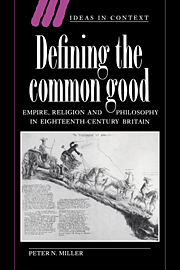Book contents
4 - The limits of sovereignty and obligation
Published online by Cambridge University Press: 23 October 2009
Summary
The triumphant ‘Great War for Empire’ stretched the territorial extent of the new British state to its greatest magnitude and its theoretical infrastructure to the breaking point. The making of empire illuminated many issues which the making of the state in 1707 had failed to define. The incorporation of Scotland had dismayed many of those who had hoped for some kind of constitutional accommodation; the wealth and distance of the British North American colonies made the implicit threat of a coerced union less realistic, at least initially. The importance of the colonies in contemporary British political–economic thinking was magnified several times in increasing colonial self–importance. Where most Britons believed colonies owed a great debt to the metropolis for the efforts recently undertaken to guarantee their security from the French and Indian menace, colonists tended to pat themselves on the back for a job well done in defence of the empire for the mother–country. Considerations of imperial security continued to guide British policy in the post–war years and, obviously, reflected the metropolitan view of what was best for Great Britain. Things looked different from the periphery. The frictions which seem to have sprung up immediately after 1763 reflect the colonial challenge to the metropolitan determination of what constituted their ‘best interest’. While Yorkshiremen, Welshmen, Londoners and even Scots, for the most part, had accepted the notion of a ‘common good’ from which they all benefited, colonists had begun to think differently.
- Type
- Chapter
- Information
- Defining the Common GoodEmpire, Religion and Philosophy in Eighteenth-Century Britain, pp. 214 - 265Publisher: Cambridge University PressPrint publication year: 1994



